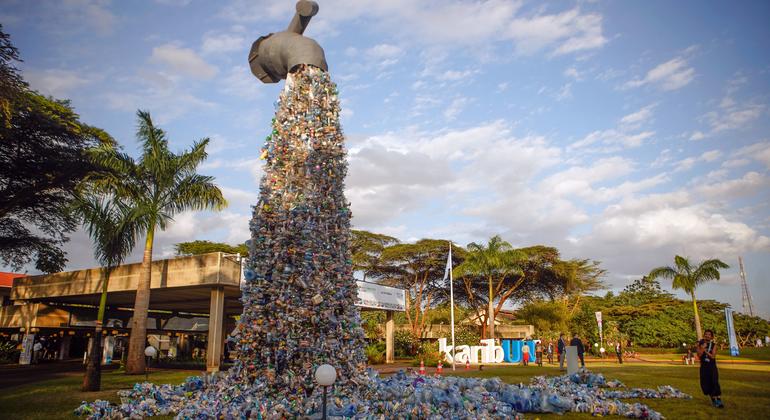Negotiations begin in South Korea to reach ‘essential’ agreement on plastic pollution


the meeting comes after two years of intergovernmental negotiations aimed at developing a legally binding global instrument covering both land and marine environments – a blink of an eye in diplomatic circles, where the agreements Multilateralism may take decades to implement.
“Our world is drowning in plastic pollution. Every year, we produce 460 million tons of plastic, most of which is quickly thrown away,” speak UN Secretary General António Guterres via video message, as he urged delegates to push for a deal.
“By 2050, the ocean could have more plastic than fish. Microplastics in our blood are creating health problems that we are only beginning to understand.”
Cautious optimism
Expressing hope for a potential historic agreement, UNEP CEO Inger Anderson emphasize that it is the “moment of truth” to act.
“Not a single person” on the planet wants plastic washing up on beaches or plastic particles circulating in their bodies or their fetusesShe affirmed, adding that it was a sentiment shared by the G20 group of industrialized nations.
“Waste pickers, civil society groups are fully involved; businesses are calling for global rules to guide this future; Indigenous people are speaking up; scientists are calling for science,” Ms. Anderson said.
“The financial industry is starting to transform at the international level. There are also clear signals that a deal is needed, including last week’s G20 statement, which said G20 leaders were determined to reach the pact by the end of the year.
Widely supported
More than 170 countries and more than 600 observer organizations have signed up for the week-long talks in the major port city of Busan, where South Korean President Yoon Suk Yeol urged delegates to agree on an air path. plastic pollution for the benefit of future generations.
“Humanity’s over-reliance on the convenience of plastic has led to an exponential increase in plastic waste; The waste accumulating in our oceans and rivers is now endangering the lives of future generations,” he said via video link.
“I sincerely hope that in the coming week, all Member States will unite together – with a sense of responsibility towards future generations – to open a new chapter of history by concluding the treaty. Convention on plastic pollution.”
Coming full circle
Officially, the negotiations are known as the discussions of the Fifth Intergovernmental Negotiating Committee (INC-5) to develop an international legally binding instrument on plastic pollution, including in the marine environment. The session follows four previous rounds that began exactly 1,000 days ago in Uruguay.
Opposite, “Some plastics can take up to 1,000 years to decompose”, UNEP Director Ms. Anderson said, and even then, “they break in every time Smaller particles exist, spread and pollute…Harming the resilience of ecosystems, blocking drainage systems in cities and also potentially harming human health and the increase in plastic pollution is emitting more greenhouse gases, pushing us deeper into climate disaster. That is why public and political pressure for action has reached its peak.”
In his message to the meeting in Busan, the UN Secretary General emphasized the need for an “ambitious, credible and fair” treaty.
Mr. Guterres emphasized that any agreement must address the life cycle of plastics – “addressing single-use and short-lived plastics, waste management and measures to remove plastics and promoting alternative materials”.
These will enable all countries to access technology and improve land and marine environments, while ensuring that the most vulnerable communities that rely on plastic collection are not left behind. , such as trash pickers.




